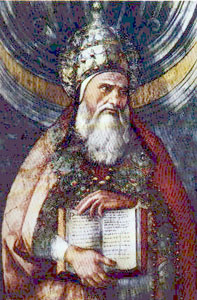Pope Pius I facts for kids
Quick facts for kids Pope Saint Pius I |
|
|---|---|
| Bishop of Rome | |

15th century portrayal of Pope Pius I by Pietro Perugino
|
|
| Church | Catholic Church |
| Papacy began | c. 140 |
| Papacy ended | c. 154 |
| Predecessor | Hyginus |
| Successor | Anicetus |
| Personal details | |
| Birth name | Pius |
| Born | c. late 1st century Aquileia, Roman Empire |
| Died | c. 154 Rome, Roman Empire |
| Sainthood | |
| Feast day | 11 July |
| Other Popes named Pius | |
Pope Pius I was an early leader of the Catholic Church. He served as the Bishop of Rome from about 140 AD until his death around 154 AD. He is known for standing against groups like the Valentinians and Gnostics during his time as pope. Both the Catholic Church and the Eastern Orthodox Church consider him a saint. His special day, called a feast day, is July 11th. It is not clear if he died as a martyr, which means dying for his faith.
In 1862, a bishop named Mariano Rodríguez de Olmedo received some of Pius I's remains. These were a gift from Pope Pius IX. The bishop wanted to bring them to the Cathedral of San Juan Bautista in Puerto Rico. The remains finally arrived there in 1933. They are covered in wax and kept in a glass case. This church is one of the oldest in the Americas. Pius I is the only pope whose remains are kept outside of Europe.
Early Life of Pius I
Pius I was likely born in Aquileia, a city in Northern Italy. This was in the late 1st century. His father was an Italian named Rufinus, also from Aquileia. This information comes from an old book called the Liber Pontificalis.
Some old writings suggest that Pius was the brother of Hermas. Hermas wrote a book called The Shepherd of Hermas. Hermas said he used to be a slave. This makes some people think that both Pius and Hermas were freedmen, meaning they were once slaves who gained their freedom. However, Hermas might have just meant he came from a family that was not rich or powerful.
Pius I's Time as Pope
According to Catholic tradition, Pius I led the church in the middle of the 2nd century. This was during the rule of Emperors Antoninus Pius and Marcus Aurelius. He is believed to be the ninth pope after Saint Peter. Pius I is said to have decided that Easter should always be celebrated on a Sunday.
He is also thought to have built one of the oldest churches in Rome, called Santa Pudenziana. During his time, a Christian teacher named Justin Martyr taught in Rome. Important people who taught different ideas, like Valentinus, Cerdon, and Marcion, also visited Rome. Pope Pius I is believed to have disagreed with the Valentinians and Gnostics who followed Marcion. He even removed Marcion from the church, a process called excommunication.
Some people used to believe that Pius died as a martyr in Rome. This idea was in older church books. However, later studies found no strong evidence that he was a martyr. So, he is not listed as one in the current official list of saints.
Feast Day Celebration
Pius I's feast day is on July 11th. This is a special day to remember him. In older church calendars, this day was celebrated as a simple feast for a martyr. Later, the way it was celebrated changed. Now, Saint Pius I can be remembered on his feast day in most places. This is unless another important celebration is already set for that day.
See also
 In Spanish: Pío I para niños
In Spanish: Pío I para niños
- List of Catholic saints
- List of popes
 | Shirley Ann Jackson |
 | Garett Morgan |
 | J. Ernest Wilkins Jr. |
 | Elijah McCoy |

